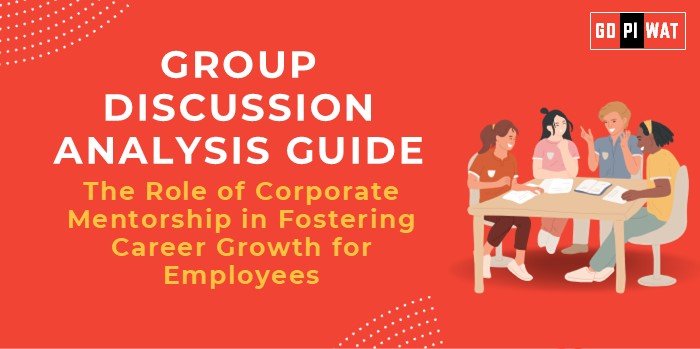📋 The Role of Corporate Mentorship in Fostering Career Growth for Employees
🌐 Introduction to the Topic
Opening Context: Corporate mentorship has emerged as a powerful strategy to accelerate employee development, foster leadership skills, and bridge knowledge gaps in the modern corporate world.
Topic Background: Originating from informal guidance practices, mentorship has become a formalized, structured component of many organizations’ employee development programs. A strong mentor-mentee relationship enhances career trajectories, aligns individual goals with organizational objectives, and contributes to retention and satisfaction.
📊 Quick Facts and Key Statistics
- 💼 Fortune 500 Insight: 70% of Fortune 500 companies have structured mentorship programs.
- 📈 Retention Rates: Employees in mentoring relationships are 5 times more likely to stay with the company.
- 🌟 Promotion Impact: 25% of mentored employees experience career promotions compared to non-mentored counterparts.
- 📚 Skill Development: Mentorship accelerates leadership readiness by 50%.
- 🔄 Reverse Mentorship: Improves cross-generational learning and adaptability.
👥 Stakeholders and Their Roles
- 🙋♂️ Employees: Direct beneficiaries; mentorship provides growth, upskilling, and career advancement.
- 🏢 Organizations: Sponsors of mentorship programs to improve performance, retention, and leadership pipelines.
- 👩🏫 Mentors: Senior leaders who share expertise, leadership insights, and networks.
- 💼 HR Departments: Key enablers in designing, implementing, and evaluating mentorship programs.
🏆 Achievements and Challenges
🌟 Achievements
- ✅ Improved Retention: Mentorship fosters stronger engagement, reducing attrition.
- ✅ Leadership Development: Programs cultivate future leaders, e.g., Google’s “20% time” mentorship initiative.
- ✅ Diversity and Inclusion: Targeted programs like Dell’s Women in Leadership Initiative enhance representation.
- ✅ Knowledge Transfer: Cross-departmental and intergenerational mentorship ensures knowledge continuity.
⚠️ Challenges
- 🔗 Mentor-Mentee Mismatch: Poor pairings can reduce program effectiveness.
- ⏳ Time Constraints: Senior mentors often face busy schedules, limiting engagement.
- 📉 ROI Measurement: Difficulty in quantifying the impact of mentorship on career growth.
🌍 Global Comparisons
- 🌐 Silicon Valley: Tech giants like Facebook and LinkedIn foster innovation with structured mentorship initiatives.
- 🇯🇵 Japan’s Senpai-Kohai Model: Long-standing cultural mentorship practices nurture professional relationships.
📖 Case Studies
- 🚀 General Electric (GE): Paired senior executives with junior leaders to accelerate promotions.
- 🔄 Microsoft: Reverse mentoring helped senior managers adapt to emerging technologies.
🗣️ Structured Arguments for Discussion
- ✅ Supporting Stance: “Mentorship creates measurable growth opportunities for employees, improving retention and innovation.”
- ❌ Opposing Stance: “Corporate mentorship lacks standardized evaluation and often suffers from time and engagement issues.”
- ⚖️ Balanced Perspective: “While mentorship accelerates growth, its success depends on clear program goals, mentor training, and tracking outcomes.”
💡 Effective Discussion Approaches
📌 Opening Approaches
- 📊 “70% of Fortune 500 companies implement mentorship programs due to proven impacts on retention and promotions.”
- ❓ “What role does mentorship play in bridging skill gaps in modern workplaces?”
↔️ Counter-Argument Handling
- 💬 Argument: “Time constraints make mentorship unsustainable.”
- 💡 Response: “Digital mentorship tools and group mentoring can reduce the burden on senior leaders while maintaining effectiveness.”
📋 Strategic Analysis of Strengths and Weaknesses
- 💪 Strengths: Enhances employee satisfaction, career growth, and leadership pipelines.
- ⚠️ Weaknesses: Time-intensive and inconsistent outcomes without monitoring.
- 🌟 Opportunities: Use of AI-driven mentorship platforms and reverse mentoring for innovation.
- 🚧 Threats: Favoritism or resistance from traditional corporate cultures.
🎓 Connecting with B-School Applications
- 📂 Real-World Applications: HR, leadership development, and employee performance projects can integrate mentorship models for analysis.
- 💡 Sample Interview Questions:
- ❓ “How would you design a mentorship program to address skill gaps in a large organization?”
- ❓ “Can mentorship reduce attrition in competitive industries like consulting?”
- 📖 Insights for B-School Students:
- Corporate mentorship aligns with leadership, people management, and career growth strategies.
- Research on reverse mentoring adds value to innovation and cross-generational learning topics.


